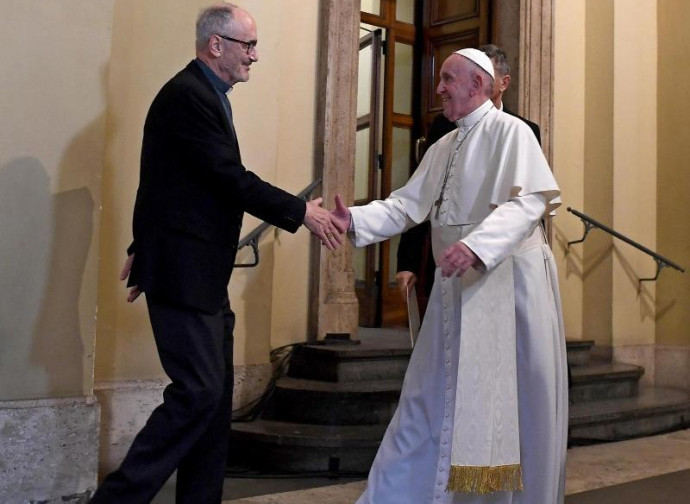Vatican-reviewed magazine destroys Social Doctrine
An article signed by Cardinal Czerny for La Civiltà Cattolica exalts the 'circular Church', that is, engaged in a form of dialogue with the world that renders it subordinate to the world. Thus making it impossible to propose a doctrine and the Church also renounces to having an original vision.

Cardinal Michael Czerny, a Jesuit and Prefect of the Pontifical Dicastery for Integral Human Development, published an article in the recently released issue of "La Civiltà Cattolica" titled: “Attualizzare e rinnovare la Dottrina sociale della Chiesa” [Actualising and renewing the Social Doctrine of the Church]. Significant is the fact that actualising comes before, and thus acts as a guide for, renewing, as if reading the signs of the times starts from the times and not from the criteria for reading them. It would therefore not be the Social Doctrine to read the times and renew them, but the contrary.
Cardinal Czerny believes that the pontificate of Francis has by now outlined the general framework in which this renewal of the Social Doctrine is to be inserted and therefore takes care to portray it. We all know its elements by now, because they consist of recurring images, a repertoire of catchphrases, albeit with little theological content. Cardinal Czerny simply takes them up and re-proposes them to us. This is how he speaks of 'clericalism' as the origin of all abuse in the Church; of the inculturation of Christianity that must not be a new colonialism; of the need to overcome the distinction between the teaching Church and the learning Church; of listening to '”The cry of the earth and the cry of the poor”, of “inverting the pyramid” by overcoming the self-referential mentality. Above all, he speaks of the new synodality in careful compliance with the usual official rhetoric.
It is now annoying to challenge this new ecclesial vocabulary, imposed by conformism, while talking about valuing differences and characterised by a principled disregard for the very different things taught by the magisterium of the previous popes. [The cardinal, for example, celebrates Aparecida as the matrix of the new paradigm, but without saying a word about Benedict XVI's intervention there, which is opposed to the reading made of it here]. It is annoying because it is the passive and complacent repetition of a dozen words and concepts - always the same ones - assumed out of habit and with which one would like to explain everything today. Gómez Dávila wrote that the communist claims to explain everything with 200 words. Today's Church uses far fewer.
A new expression seems to be that of the 'circular Church', which seems to be borrowed from the circular economy that is fashionable today. If I understand Cardinal Czerny correctly, 'circular Church' would mean a Church that receives before giving, that learns before teaching, that listens before speaking. If so, it is a new formula to say something typical of the Church after the 'anthropological turn', namely it is equal, if not subordinate, to the world. This concept of a circular Church sums up all the usual images seen above.
The cardinal applies this framework to the Social Doctrine of the Church, and what happens? The first consequence is that it can no longer be a 'doctrine'. The "circularity" between the life of the Church and history, as precisely stated, means at least two things: that the Church does not have a totally proper and original word to say, and that what it does say is always partial, the fruit precisely of an incessant circularity with situations. Cardinal Czerny's historicism does not allow any doctrine but, at most, some experience of dialogue and mutual accompaniment without much pretension. Instead, the term 'doctrine' indicates something else: Leo XIII had elaborated a 'doctrinal corpus' that is still valid today, because it is still valid in its fundamental principles. In Cardinal Czerny's vision, however, 'lifestyle' has the upper hand over doctrine. This is no small change. Especially since this 'lifestyle' is only a bundle of attitudes.
Circularity then entails 'pastoral conversion', as Czerny himself says, and thus the primacy of praxis, of activity over passivity, of 'activa participatio' over contemplation and mystery, something no social document has ever said. I found this sentence of our Cardinal rather disturbing: “Overcoming a model of the Church solely centred on sacramental action requires an effort to promote pastoral action that takes up the challenges posed by history”. But at this point, all history becomes a 'sacrament' and the direct action of grace is reduced - to the point of denying it? - even for history.
Czerny re-proposes the idea that the Social Doctrine of the Church belongs to the mission of the Church and is not a marginal but an essential element, but changes the meaning of what is intended by "mission". It should no longer be understood as "the sphere of practical applications that follows a body of dogmatic truths, but of an action that is located at the very heart of the evangelical proclamation"; with which it remains to be explained how one can "proclaim" if not by announcing dogmatic truths that, if they are not to be reductively "applied", must however be lived in their original capacity to say what history and situations cannot say. So much for circularity.
